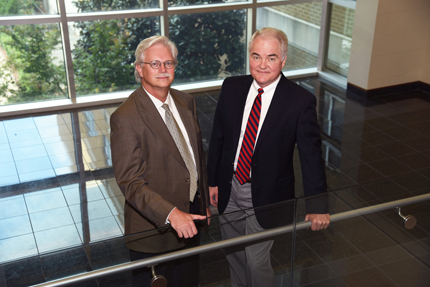UMMC receives record award to combat state’s obesity epidemic
One-third of Mississippi adults are obese. So are one-fifth of the state's children.
It's an epidemic impossible to understate. Be it caused by diet, lack of exercise, genetics or environment - or any combination of those - there is no quick fix for a health condition affecting one million Mississippians.
However, there are steps that can be taken, and the University of Mississippi Medical Center is about to take 20 million of them.
Last month, the Medical Center received its largest single award ever to confront obesity and create a healthier Mississippi. The five-year, $19.9 million award from the National Institutes of Health will fund the Mississippi Center for Clinical and Translational Research (CCTR).
Supported by the Institutional Development Award Program, the CCTR's mission is the prevention, diagnosis and treatment of obesity and related health conditions.
“Mississippi has the highest rate of obesity in the United States,” said Dr. James Wilson, professor of physiology and biophysics and the project's lead investigator. “High blood pressure, diabetes, chronic kidney disease and cardiovascular disease are all associated with this one preventable cause.”
Obesity also increases a person's risk of stroke, certain cancers and neurological disorders. Combined, obesity-related illnesses cost the United States an estimated $150 billion each year.
To address this problem, health scientists need an approach that brings their research from the laboratory bench to the greater population. This new award enhances UMMC's ability to conduct clinical and translational research.

Dr. Richard Summers and Dr. James Wilson
“Translational research takes basic science findings and uses them to develop interventions that will affect treatment options and public health,” Wilson said.
These could be community programs, such as healthy-eating initiatives. Alternatively, they could be pharmaceuticals that treat diabetes. The new award does not fund particular projects; instead, the CCTR will invest in the people who will find solutions.
“A significant mission of the program will be to train junior faculty into established investigators,” Wilson said.
Training will come from the CCTR's Professional Development Core, which will mentor junior faculty who conduct obesity-related research. In addition, the Pilot Projects Program will fund promising studies while those researchers seek outside funding to sustain their activities.
“One of the major goals is to provide a coordinated program of mentorship and support that will facilitate the work of translational researchers who will tackle the epidemic of obesity,” said Dr. John Hall, Arthur C. Guyton Professor and Chair of Physiology and Biophysics and a leader of the Professional Development Core. “The overarching goal is to improve lives through discovery, innovation, education, better patient care and prevention of obesity and related disorders.”
Dr. Richard Summers, associate vice chancellor for research, emphasized the importance of developing new talent to spur clinical research - a theme present throughout UMMC's history.
“When the Medical Center was built in 1955, most of the faculty who formed our early clinical research programs were young investigators,” Summers said. Organ transplant pioneer Dr. James Hardy was 37 in 1955; cardiovascular physiologist Dr. Arthur Guyton was 36. “Our goal is to build a pipeline of investigators and clinical research for years to come.”
Dr. Jeffrey Vitter, University of Mississippi chancellor, extended his congratulations to the Medical Center for receiving the award.
“We are honored by this NIH investment to substantially enhance our capacity and success in translating research discoveries and innovations to better health outcomes,” Vitter said.
Strong basic research programs in cardiovascular function and disease give UMMC a starting point for clinical applications. Recent infrastructure enhancements will advance clinical and translational research capabilities, Wilson said. These include the Center for Bioinformatics and Biostatistics, an Enterprise Data Warehouse and a Clinical Research Support Program.
“All of these pieces brought together give UMMC the infrastructure to enhance clinical research,” Summers said.
When two campus construction projects - one nearly complete and the other in the planning stages - wrap up, UMMC will have a full set of physical tools needed for the CCTR's success.
“The timing of this magnificent grant couldn't be better as it coincides with the development of our Translational Research Center and Clinical Research Unit in the University Hospital, facilities that will be crucial to our success in clinical and translational research,” said Dr. LouAnn Woodward, vice chancellor for health affairs. “We look forward to putting these assets to work in the cause of discovering tomorrow's treatments and cures.”
However, UMMC cannot solve the obesity epidemic in Mississippi on its own. Tougaloo College and the University of Southern Mississippi will be CCTR collaborators.
“Those institutions will be key in community outreach efforts,” Wilson said.
The CCTR also will work with two other NIH-funded clinical and translational research centers: The Mayo Clinic in Rochester, Minnesota, and the Pennington Biomedical Research Center in Baton Rouge, Louisiana. Pennington has expertise in nutrition and metabolism, important to understanding obesity, while UMMC and Mayo entered into a collaborative agreement in 2014 that allows the institutions to share data tools and trial participants. Close ties have already developed around cancer research.
“In five years, we hope to have 10 or more junior investigators successfully funded as a direct result of this grant,” and on a trajectory to independent obesity research programs, Wilson said. “As an additional result, we hope to recruit senior-level population and clinical investigators with the ability to collaborate with each other.”
Summers also said he is “very proud of Wilson and his efforts so far.” Now, he - and the Medical Center - look forward to the future.
“This award has the potential to be transformational for us,” Summers said.


